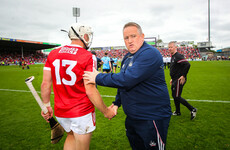IN DUBLIN RECENTLY for the Institute of Sport Conference, Professor Asker Jeukendrup took time out to chat to The42. Jeukendrup is a sports nutrition scientist and Ironman triathlete. He is also the author of a number of books on sports nutrition, while his list of high-profile clients includes the British Olympic Association, the Rabobank cycling team and Chelsea FC.
You’ve described the field of sports science as being akin to the Wild West. Could you elaborate on this point?
It’s not just sports science but in sports science and nutrition as well, there’s a lot of information out there and a lot of information is good information, but a lot of the information is not good information. It’s not based on any evidence.
I try to describe the landscape that the athlete has to navigate where they’re contacted by so many people and so many people try to point them in a direction — sometimes with the best of intentions, sometimes with not so good intentions — but very often, it’s not the best direction, based on the scientific evidence that we have.
So I think of the landscape where, for example, there are lots of supplements on the market all with different claims that they can do something magical and wonderful. There are some people talking about training methods that work better than others — and the athlete doesn’t necessarily have the background to deal with that. He might make decisions about what information you can trust and what you can’t trust. So it is important that we enable the athletes to be able to deal with it, so they can navigate the Wild West themselves.
Another one of your areas of interest is recovery. What can an athlete do to achieve optimal recovery?
There are two things. Acute recovery — if you only have a few hours to recover for your next competition. Or when you try to get better over a longer period of time.
If you’re interested in very short-term recovery and you have to compete again in a few hours or train again in a few hours, it is really important to get your hydration right. It’s really important to ensure you take on board enough carbohydrates so you can restore your glycogen and it is important to get a little bit of protein as well to start the rebuilding of the muscle.
But some of the things you do in the short term may actually impair your recovery longer term. So an example of that is if you use high dosages of antioxidants, which may help you in the short term, because you may feel less muscle pain and less muscle damage, but longer term it can actually be detrimental to your training outcome. So you may not get the same benefits from your training.
Another topic of interest you cover is world-class athletes and how they come to be defined as ‘world class’. Is it possible for an athlete to have a bad or imperfect diet, for instance, and still be world class?
The first question I would ask is: is there such a thing as a perfect diet? I think there probably isn’t. I think another question is can you still be world class if you don’t do everything according to recommendations. And we have plenty of evidence that you can do really well.
I’m sure that athletes don’t always prepare 100% but they still perform really well. The question is: if they had prepared really well, would they have been even better? I think they probably would be.
If Lionel Messi is 80% fit, is he a good player? Yes he is. He’s a brilliant player even at 80%. Would you want to see him at 100%? Yes. Does he always need to be 100% for every chance that he gets? Probably not.
But a lot of the athletes we work with have to be on top of their game to win and therefore, they have to get everything right, including nutrition.
Finally, our understanding and application of diet and nutrition in relation to sport has come a long way in the last 20 years. Do you feel there is still considerable room for improvement in this regard in the next 20 years and onwards thereafter?
I think we’re just at the early stages of it. I don’t think that a) we really know everything and b) that we apply it in the right ways. So there’s always room for improvement. I think with nutrition, as the margins are becoming smaller and smaller, the facts on nutrition are becoming bigger and bigger. So it’s my firm belief that it’ll become more and more important to get nutrition right.











Well done Bray Wanderers
Agent Kenny you have been found out mission abort mission abort…….. KOH = Kenny our hero
Kenny out
I feel sorry for all the Shams fans. Mick Leech, Johny Fulham, Frank O Neill, and John Giles. Ye will never see great players like them again.
Yeh last year was bloody nightmare for us all…. Jaysus..